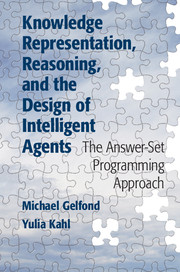 Knowledge Representation, Reasoning, and the Design of Intelligent Agents
Knowledge Representation, Reasoning, and the Design of Intelligent Agents Book contents
- Frontmatter
- Dedication
- Contents
- Preface
- 1 Logic-Based Approach to Agent Design
- 2 Answer Set Prolog (ASP)
- 3 Roots of Answer Set Prolog
- 4 Creating a Knowledge Base
- 5 Representing Defaults
- 6 The Answer-Set Programming Paradigm
- 7 Algorithms for Computing Answer Sets
- 8 Modeling Dynamic Domains
- 9 Planning Agents
- 10 Diagnostic Agents
- 11 Probabilistic Reasoning
- 12 The Prolog Programming Language
- Appendix A ASP Solver Quick-Start
- Appendix B Aspide
- Appendix C Introduction to SPARC
- Appendix D Code
- Bibliography
- Index
9 - Planning Agents
Published online by Cambridge University Press: 05 July 2014
- Frontmatter
- Dedication
- Contents
- Preface
- 1 Logic-Based Approach to Agent Design
- 2 Answer Set Prolog (ASP)
- 3 Roots of Answer Set Prolog
- 4 Creating a Knowledge Base
- 5 Representing Defaults
- 6 The Answer-Set Programming Paradigm
- 7 Algorithms for Computing Answer Sets
- 8 Modeling Dynamic Domains
- 9 Planning Agents
- 10 Diagnostic Agents
- 11 Probabilistic Reasoning
- 12 The Prolog Programming Language
- Appendix A ASP Solver Quick-Start
- Appendix B Aspide
- Appendix C Introduction to SPARC
- Appendix D Code
- Bibliography
- Index
Summary
In the next several chapters we discuss the application of the methodology for representing knowledge about dynamic domains and ASP programming to the design of intelligent agents capable of acting in a changing environment. The design is based on the agent architecture from Section 1.1. In this chapter we address planning — one of the most important and well studied tasks that an intelligent agent should be able to perform (see step 3 of the agent loop from Section 1.1).
Classical Planning with a Given Horizon
We start with classical planning in which a typical problem is defined as follows:
• A goal is a set of fluent literals that the agent wants to become true.
• A plan for achieving a goal is a sequence of agent actions that takes the system from the current state to one that satisfies this goal.
• Problem: Given a description of a deterministic dynamic system, its current state, and a goal, find a plan to achieve this goal.
A sequence α of actions is called a solution to a classical planning problem if the problem's goal becomes true at the end of the execution of α.
In this chapter we show how to use ASP programming techniques to solve a special case of the classical planning problem in which the agent has a limit on the length of the allowed plans. The limit is often referred to as the horizon of the planning problem.
- Type
- Chapter
- Information
- Knowledge Representation, Reasoning, and the Design of Intelligent AgentsThe Answer-Set Programming Approach, pp. 192 - 215Publisher: Cambridge University PressPrint publication year: 2014
